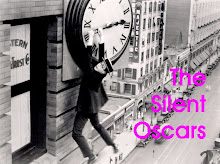 In case you know nothing about it, Intolerance weaves four separate story lines—the life of Christ, the fall of Babylon, the massacre of the Huguenots, and a modern-day story about the victims of a overreaching reform movement—into a three-plus hour spectacle that might be the most ambitious movie ever made. Accounts vary as to how much of his personal fortune Griffith poured into the production—some say as much as $2 million, the most for any film before Gone With The Wind—but there's no question that this was the most lavish production of the silent era.
In case you know nothing about it, Intolerance weaves four separate story lines—the life of Christ, the fall of Babylon, the massacre of the Huguenots, and a modern-day story about the victims of a overreaching reform movement—into a three-plus hour spectacle that might be the most ambitious movie ever made. Accounts vary as to how much of his personal fortune Griffith poured into the production—some say as much as $2 million, the most for any film before Gone With The Wind—but there's no question that this was the most lavish production of the silent era.Or to put it another way, to show the sack of Babylon, Griffith basically built a full-scale replica of the ancient city on a Hollywood backlot and then laid siege to it.
 Structurally, Intolerance is as audacious as anything ever attempted on film—four simultaneous stories linked only by a common theme and the generally rising action—with the editing style growing more complex as the action in each story reaches its climax. The film's last half hour, with quick cross-cut shots between a marauding army, a racing car, a speeding train, the slaughter of the Huguenots and the crucifixion of Christ, has been described as a fugue, a concept borrowed from music where two or more voices entering successively and sung in either imitation or counterpoint to build on a common theme.
Structurally, Intolerance is as audacious as anything ever attempted on film—four simultaneous stories linked only by a common theme and the generally rising action—with the editing style growing more complex as the action in each story reaches its climax. The film's last half hour, with quick cross-cut shots between a marauding army, a racing car, a speeding train, the slaughter of the Huguenots and the crucifixion of Christ, has been described as a fugue, a concept borrowed from music where two or more voices entering successively and sung in either imitation or counterpoint to build on a common theme. The film's most unforgettable performance—and for me, the best in any film in 1916—came from Constance Talmadge, sister of the better known Norma Talmadge. In the Babylonian sequence of Intolerance, she plays "the Mountain Girl," a pretty, perky, petulant teenage beauty who finds herself fighting against a palace conspiracy that threatens to topple the kingdom. Wide-eyed and gangly-limbed, Talmadge is as hyperactive as a puppy amped up on kibble and amphetamines, windmilling her way across the screen, and you can't take your eyes off her. Neither could audiences in 1916 and she quickly became a star.
The film's most unforgettable performance—and for me, the best in any film in 1916—came from Constance Talmadge, sister of the better known Norma Talmadge. In the Babylonian sequence of Intolerance, she plays "the Mountain Girl," a pretty, perky, petulant teenage beauty who finds herself fighting against a palace conspiracy that threatens to topple the kingdom. Wide-eyed and gangly-limbed, Talmadge is as hyperactive as a puppy amped up on kibble and amphetamines, windmilling her way across the screen, and you can't take your eyes off her. Neither could audiences in 1916 and she quickly became a star."[I]t's a mark of her skill," Eagan wrote, "that she stands out in a segment filled with orgies, sacrifices, semi-nudity, wild animals, and wholesale destruction."
Working primarily in comedies, Talmadge would excel throughout the silent era—look for her in The Matrimaniac, the best of the dozen films Douglas Fairbanks made in 1916, a wild, stunt-filled romantic comedy that no doubt later served as a blueprint for the get-me-to-the-wedding-on-time story lines of Harold Lloyd's Girl Shy and For Heaven's Sake—then retired with the advent of sound, famously telling her sister Norma, "Quit pressing your luck, baby. The critics can't knock those trust funds Mama set up for us."
PICTURE
winner: Intolerance (prod. D.W Griffith)
nominees: The Chaplin Mutuals (prod. Charles Chaplin); Hell's Hinges (prod. Thomas H. Ince); Judex (prod. Société des Etablissements L. Gaumont)
Must-See Movies: Intolerance
Recommended Films: Behind The Screen; The Count; The Fireman; The Floorwalker; The Habit of Happiness; Hell's Hinges; Judex; The Matrimaniac; One A.M.; The Pawnshop; Police; The Rink; The Waiter's Ball
Of Interest: Civilization; Flirting With Fate; Hævnens nat a.k.a. Blind Justice; His Picture in the Papers; Hoodoo Ann; Joan the Woman; The Mystery of the Leaping Fish; A Natural Born Gambler; Reggie Mixes In; Snow White; The Social Secretary; Sold For Marriage; 20,000 Leagues Under The Sea; Where Are My Children?
ACTOR
winner: William S. Hart (Hell's Hinges)
nominees: Charles Chaplin (The Chaplin Mutuals); Douglas Fairbanks (The Fine Arts Film Company Comedies); Tyrone Power, Sr. (Where Are My Children?)
ACTRESS
winner: Mae Marsh (Hoodoo Ann and Intolerance)
nominees: Marguerite Clark (Snow White); Lillian Gish (Sold For Marriage); Norma Talmadge (Going Straight and The Social Secretary)
DIRECTOR
winner: D.W. Griffith (Intolerance)
nominees: Charles Chaplin (The Chaplin Mutuals); Louis Feuillade (Judex)
SUPPORTING ACTOR
winner: Eugene Pallette (The Children In The House and Going Straight)
nominees: George Fawcett (The Habit Of Happiness); Theodore Roberts (Joan The Woman); Fred Warren (The Matrimaniac)
SUPPORTING ACTRESS
winner: Constance Talmadge (Intolerance)
nominees: Dorothy G. Cumming (Snow White); Bessie Love (Reggie Mixes In); Musidora (Judex)
SCREENPLAY
winner: Anita Loos (His Picture In The Papers (screenplay), Intolerance (titles), The Social Secretary (screenplay), American Aristocracy (story), The Matrimaniac (screenplay) and The Americano (scenario and titles))
nominees: Charles Chaplin (The Chaplin Mutuals); Lois Weber and Phillips Smalley, from a story by L. Payton and F. Hall (Where Are My Children?)
SPECIAL AWARDS Eugene Gaudio, George M. Williamson and J. Ernest Williamson (20,000 Leagues Under The Sea) (Cinematography); D.W. Griffith , James Smith and Rose Smith (Intolerance) (Film Editing); Walter L. Hall (Intolerance) (Art Direction-Set Design)













2 comments:
Boo hoo - I was hoping for a shout out to Miriam Cooper in Intolerance. She's one of my faves and, outside of Griffith, pretty hard to find. However, I bow the Academy's choices.
With any luck, this (here) will link to a photo of Miriam Cooper.
Cooper played "the Friendless One" in the Modern sequence of Intolerance, and quite memorably. She and Raoul Walsh (who would later direct such films as White Heat and High Sierra) married around this time (secretly -- apparently the incredibly Victorian D.W. Griffith would not have approved of two of his actors getting married. Not until after Walsh moved over to Fox did they make their marriage known).
Cooper made 100 movies in her career, but largely abandoned acting after her marriage, working only for her husband after they left Griffith -- in all (if I counted up correctly), Walsh directed his wife in 16 movies.
She made her last movie in 1923. She and Walsh had two children but divorced in 1925. She never remarried. Apparently she invested her movie money well because she lived comfortably until her death in 1976.
What else does one need to know -- she was born up the road from me, in Baltimore, to well-to-do parents, but after her father abandoned them, she wound up living in poverty in Baltimore's Little Italy. How she made it from there to working for Griffith, I'm not sure, but she played Mae marsh's older sister in The Birth of a Nation and had the great part you mentioned in Intolerance.
Oh, and she was a friend of Carole Lombard, damaged her eyes by looking directly into an arc light on set, and she played a lot of golf, well enough to hit three holes-in-one.
Good for her.
Post a Comment